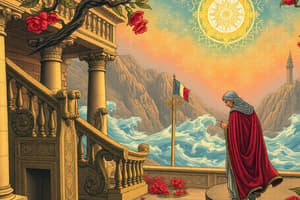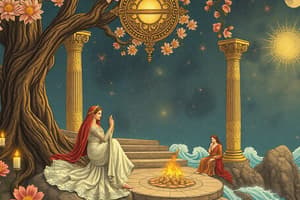Podcast
Questions and Answers
Who is traditionally credited as the author of the Iliad?
Who is traditionally credited as the author of the Iliad?
- Homer (correct)
- Plato
- Aristotle
- Sophocles
Which epic poem is attributed to Homer, along with the Iliad?
Which epic poem is attributed to Homer, along with the Iliad?
- The Aeneid
- The Metamorphoses
- The Epic of Gilgamesh
- The Odyssey (correct)
For which ancient culture were the Iliad and the Odyssey of central importance?
For which ancient culture were the Iliad and the Odyssey of central importance?
- Persian
- Egyptian
- Roman
- Greek (correct)
What is a common descriptor given to Homer, reflecting his historical significance?
What is a common descriptor given to Homer, reflecting his historical significance?
What is the Iliad primarily about?
What is the Iliad primarily about?
Flashcards
Who was Homer?
Who was Homer?
Ancient Greek poet credited with the Iliad and the Odyssey.
What is an epic poem?
What is an epic poem?
A long narrative poem recounting heroic deeds.
What is the Iliad about?
What is the Iliad about?
A Greek epic poem about the Trojan War
What is the Odyssey about?
What is the Odyssey about?
Signup and view all the flashcards
What is a myth?
What is a myth?
Signup and view all the flashcards
Study Notes
- Homer is the traditionally ascribed author of the ancient Greek epic poems, the Iliad and the Odyssey.
- He is revered as one of the greatest and most influential authors in history.
- The ancient Greeks generally believed that Homer was a historical figure
- Some modern scholars debate whether Homer was a single individual or a composite figure.
- The 'Homeric Question' concerns the authorship, origins, and unity of the Iliad and the Odyssey.
- Those who believe the poems were written by a single author are called "Unitarians."
- Analysts believe the poems were assembled from shorter oral lays.
- Neoanalysts focus on thematic unity and coherence within the poems.
- Oral tradition and performance played a significant role in the composition and transmission of the poems.
- Milman Parry and Albert Lord's work on oral tradition in Yugoslavia provided insights into Homeric composition.
- Formulaic language, repetition, and stock scenes are characteristic of oral epic poetry.
- The poems were likely composed in performance and gradually written down over time.
- Homeric Greek is a literary language based on Ionic Greek, with influences from other dialects, especially Aeolic Greek.
- This mixed dialect suggests a pan-Hellenic audience and a long period of oral transmission.
- The Iliad narrates a period of the Trojan War, focusing on the wrath of Achilles.
- The Odyssey recounts the ten-year journey of Odysseus returning home to Ithaca after the Trojan War.
- The Iliad is set during the Trojan War, specifically the final year of the siege of Troy.
- Key events include the quarrel between Achilles and Agamemnon, the death of Hector, and the fall of Troy.
- The Odyssey follows Odysseus's journey, filled with mythical creatures and challenges.
- Odysseus encounters figures such as Calypso, Circe, and the Cyclops Polyphemus.
- Both poems offer insights into ancient Greek values, beliefs, and society.
- Concepts such as honor (timē), glory (kleos), and fate (moira) are central to the narratives.
- The poems reflect the importance of hospitality (xenia) and the relationship between gods and humans.
- The characters in the Iliad and the Odyssey are complex and multifaceted.
- Achilles is known for his rage and his pursuit of glory.
- Odysseus is famed for his cunning, intelligence, and resilience.
- Other notable characters include Hector, Agamemnon, Helen, Penelope, and Telemachus.
- Homer's works have had a profound influence on Western literature and art.
- They have inspired countless adaptations, translations, and reinterpretations.
- The themes, characters, and stories continue to resonate with modern audiences.
- Homeric epics served as foundational texts for Greek education and culture.
- They provided moral and ethical examples, as well as historical and mythological knowledge.
- The poems were recited and performed at festivals and gatherings.
- The Odyssey, in particular, can be seen as an archetypal adventure story.
- Odysseus’s journey home is a metaphor for the challenges and struggles of life.
- The concept of nostos, or homecoming, is a central theme in the Odyssey.
- The Iliad explores the nature of war, heroism, and human suffering.
- The wrath of Achilles and its consequences are a major focus of the poem.
- Both poems offer a glimpse into the religious beliefs of the ancient Greeks.
- The gods play an active role in the lives of humans, often intervening in their affairs.
- Figures like Zeus, Hera, Athena, and Poseidon are prominent in both epics.
- The depiction of the gods reflects both their power and their flaws.
- The world of Homeric Greece is characterized by a warrior culture.
- Honor, courage, and military prowess are highly valued.
- Battles, duels, and heroic feats are common occurrences in the poems.
- The Iliad and the Odyssey were originally composed and transmitted orally.
- Bards, or aoidoi, would perform the poems from memory, often improvising and adapting them.
- The development of writing in Greece allowed for the eventual transcription and standardization of the texts.
- The Homeric epics have been the subject of scholarly debate for centuries.
- Questions surrounding authorship, date, and composition continue to be explored.
- New discoveries and interpretations continue to shed light on these ancient poems.
- Homer's influence extends beyond literature to art, music, and philosophy.
- His works have inspired numerous paintings, sculptures, operas, and philosophical treatises.
- The enduring popularity of the Iliad and the Odyssey is a testament to their timeless appeal.
- The poems explore universal themes that resonate with audiences across cultures and time periods.
- The stories of heroes, gods, and epic journeys continue to captivate and inspire.
- The 'Catalogue of Ships' in the Iliad provides a detailed list of the Achaean forces.
- It offers valuable insights into the geography and political organization of ancient Greece.
- The Telemachy, the first four books of the Odyssey, focuses on Telemachus's journey.
- Telemachus searches for news of his father, Odysseus, and asserts himself in Ithaca.
- The Odyssey is characterized by its intricate plot structure.
- It uses flashbacks and multiple perspectives to tell Odysseus's story.
- The Iliad is more focused on a single, linear narrative, centered on the Trojan War.
- Homer's use of epithets, stock phrases used to describe characters or objects adds to the musical texture.
- "Swift-footed Achilles" and "rosy-fingered Dawn" are examples of frequently used epithets.
- The poems were written in dactylic hexameter, an ancient Greek meter associated with epic poetry.
- The rhythm and structure of the meter contribute to the poems' grandeur and memorability.
- Homer's works provide valuable information about ancient Greek society, culture, and values.
- They offer insights into the lives of both ordinary people and aristocratic elites.
- The poems reflect the importance of family, community, and social obligations.
- The concept of fate (moira) plays a significant role, shaping the actions and destinies of the characters.
- The gods are often portrayed as capricious and prone to human emotions.
- Their interventions in human affairs can have both positive and negative consequences.
- The Homeric epics have been translated into countless languages and adapted for various media.
- They continue to be studied and enjoyed by readers around the world.
- The legacy of Homer endures as one of the most important figures in Western literary history.
Studying That Suits You
Use AI to generate personalized quizzes and flashcards to suit your learning preferences.




